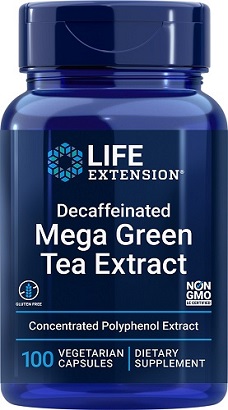Rutgers Study Shows That Taking EGCG Supplements Or Drinking Green Tea Can Cause Liver Damage In Some!
EGCG Supplements -Green Tea - Epigallocatechin Gallate Jan 27, 2023 2 years, 11 months, 3 days, 10 hours, 39 minutes ago
While there has been many articles and studies extolling the health benefits of
green tea and its phytochemical catechin: Epigallocatechin Gallate (EGCG), many are unaware of drinking green tea often or even taking green tea or EGCG supplements cause liver damage in some!

In fact, in the current COVID-19 pandemic, as a result of many studies showing that green tea and the phytochemical Epigallocatechin Gallate (EGCG) might have antiviral and anti-inflammatory properties to help with COVID-19 infections, many have taken to drinking excessive amounts of green tea or even resorted to taking high doses of
EGCG supplements!
https://www.thailandmedical.news/news/covid-19-therapeutics-computational-screenings-show-a-variety-of-natural-phytochemicals-could-have-efficacy-against-sars-cov-2-including-egcg-from-gre
https://www.thailandmedical.news/news/covid-19-herbs-scientist-study-phytochemicals-found-in-green-tea-such-as-theaflavins-,-catechins-and-myricetins-as-potential-antivirals-against-sars-c
https://www.thailandmedical.news/news/covid-19-herbs-german-study-shows-green-tea,-chokeberry-and-pomegranate-juices-inhibit-sars-cov-2-in-vitro,-but-beware-of-vitro-studies
https://www.thailandmedical.news/news/flavonoids-epigallocatechin,-baicalin,-hesperetin,-luteolin-and-quercetin-helps-prevent-covid-19-induced-gastrointestinal-inflammation-and-diarrhea
A new study by researchers from Department of Clinical and Preventive Nutrition Sciences, Rutgers University School of Health Professions, Newark, New Jersey-USA has found that the predominant catechin in green tea, epigallocatechin gallate (EGCG), may be hepatotoxic in high doses.
Thailand Medical News in our previous coverage had also warned that individuals with UGT1A4 (Uridine 5’-Diphospho-glucuronosyltransferase 1A4) gene variants were also hepatoxic to green tea based on a study by researchers from the University of Minnesota.
https://www.thailandmedical.news/news/herbal-medicine-u-s-scientists-warns-that-green-tea-is-hepatoxic-to-those-with-ugt1a4-gene-variants
The study team from Rutgers aimed to investigate the influence of catechol-O-methyltransferase (COMT) and uridine 5’-diphospho-glucuronosyltransferase 1A4 (UGT1A4) genotypes on cha
nges in liver injury biomarkers in response to long-term, high-dose green tea extract (GTE) supplementation among postmenopausal women.
The study tea also conducted a secondary analysis utilizing data from the Minnesota Green Tea Trial (N = 1,075), in which participants were randomized to consume high-dose GTE (843 mg/day EGCG) or placebo capsules for 12 months.
Detailed analysis of covariance adjusting for potential confounders was performed to examine changes in aspartate aminotransferase (AST), alanine aminotransferase (ALT), AST: ALT ratio, and alkaline phosphatase from baseline to months 3, 6, 9, and 12 across COMT and UGT1A4 genotypes. Mean age and BMI within the GTE group (n = 400) were 59.8 yrs and 25.1 kg/m2, respectively, and 98% of subjects were white.
From baseline to month 3, mean AST: ALT ratio change was +1.0% in the COMT (rs4680) A/G genotype versus −4.8% in the A/A genotype (p = 0.03). From baseline to months 6 and 9, respectively, mean ALT change was +78.1% and +82.1% in the UGT1A4 (rs6755571) A/C genotype versus +28.0% and +30.1% in the C/C genotype (p < 0.001 and p = 0.004, respectively).
The UGT1A4 (rs6755571) A/C genotype may be an important risk factor for clinically-relevant serum transaminase elevations with 6-9 months of high-dose GTE supplementation among postmenopausal women. Understanding the genetic underpinnings of GTE-related hepatotoxicity may allow for a genetically-informed paradigm for therapeutic use of GTE.
The study findings were published in the peer reviewed Journal of Dietary Supplements.
https://www.tandfonline.com/doi/full/10.1080/19390211.2022.2128501
Though taking high-dose green tea extract for an extended period may offer some protection against cancer, cardiovascular disease, obesity, and type 2 diabetes, it may also cause liver damage in certain groups of individuals especially those with either one of two types of genetic variants
Senior author, Dr Hamed Samavat, an assistant professor of nutrition sciences at the Rutgers School of Health Professions told Thailand
Medical News, “Learning to predict who will suffer liver damage is potentially important because there’s growing evidence that high-dose green tea extract may have significant health benefits for those who can safely take it.”
Utilizing data from the Minnesota Green Tea Trial, a large study of green tea’s effect on breast cancer, the study team investigated whether individuals with certain genetic variations were more likely than others to show signs of liver stress after a year of ingesting 843 milligrams per day of the predominant antioxidant in green tea, a catechin called epigallocatechin gallate (EGCG).
The study team led by Dr Laura Acosta, then a doctoral student, now a graduate, selected two genetic variations in question because each controls the synthesis of an enzyme that breaks EGCG down.
The study team selected the Minnesota Green Tea Trial because it was a large, well-designed study of a unique population. The year-long, placebo-controlled trial included more than 1,000 postmenopausal women and collected data at 3, 6, 9 and 12 months.
A detailed analysis by the study team showed that early signs of liver damage were somewhat more common than normal in women with one variation in the catechol-O-methyltransferase (COMT) genotype and strongly predicted by a variation in the uridine 5’-diphospho-glucuronosyltransferase 1A4 (UGT1A4) genotype.
It was found that on average, participants with the high-risk UGT1A4 genotype saw the enzyme that indicates liver stress go up nearly 80 percent after nine months of consuming the green tea supplement, while those with low-risk genotypes saw the same enzyme go up 30 percent.
Dr Samavat commented, “We’re still a long way from being able to predict who can safely take high-dose green tea extract.”
Interestingly, the study team noted that the risk of liver toxicity is only associated with high levels of green tea supplements and not with drinking green tea or even taking lower doses of green tea extract.
Dr Samavat added, “Variations in this one genotype don’t completely explain the variations in liver enzyme changes among study participants. The full explanation probably includes a number of different genetic variations and probably a number of non-genetic factors. Still, we do think we have identified an important piece of the puzzle and taken a step toward predicting who can safely enjoy any health benefits that high-dose green tea extract provides.”
For the latest Supplement Updates, keep on logging to Thailand
Medical News.
